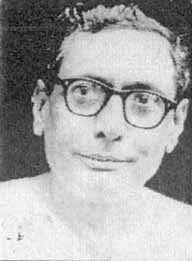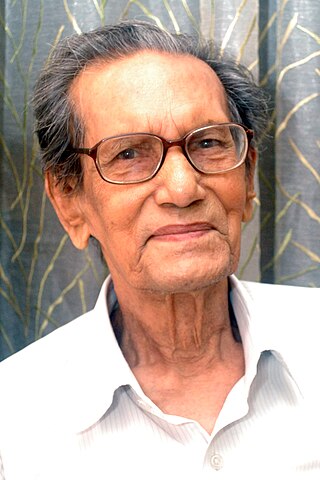
Tezpur is a city and urban agglomeration in Sonitpur district, Assam state, India. Tezpur is located on the banks of the river Brahmaputra, 175 kilometres (109 mi) northeast of Guwahati, and is the largest of the north bank cities with a population exceeding 100,000 as per Metropolitan Census 2011.

Jyoti Prasad Agarwala was a noted Indian playwright, songwriter, poet, writer and film maker from Assam. He was considered as Assamese cultural icon, deeply revered for his creative vision and output and is popularly called the Rupkonwar of Assamese culture. In fact, he is regarded as the founder of Assamese cinema for Joymoti (1935). His death anniversary is observed as Silpi divas his honor.

Assamese cinema, also known as Jollywood, is an Indian film industry of Assamese-language motion pictures. It is based in Assam, India. The industry was born in 1935 when Jyoti Prasad Agarwala released his movie Joymoti. Since then the Assamese cinema has developed a slow-paced, sensitive style, especially with the movies of Bhabendra Nath Saikia and Jahnu Barua. The industry is called Jollywood, named for Agarwala's Jyoti Chitraban Film Studio.
Joymoti Konwari, was the wife of Tai-Ahom Prince Gadapani. She was accorded the honorific Mohiyokhi on account of her heroic endurance of torture until the end, dying at the hands of royalists under Sulikphaa Loraa Roja without disclosing her exiled husband Prince Gadapani's whereabouts, thereby enabling her husband to rise in revolt and assume kingship. Gadapani and Joymoti's son Rudra Singha had the Joysagar Tank dug at the spot where she was tortured. The first Assamese film Joymoti, directed in 1935 by Jyoti Prasad Agarwala, was based on her life.

Gauhati University, also known as GU, is a collegiate public state university located in Guwahati, Assam, India. It was established on 26 January 1948 under the provisions of an Act enacted by the Assam Legislative Assembly. It is the oldest university in Northeast India.

Joymoti or Joimoti, released on 10 March 1935, was the first Assamese film made. Based on Lakshminath Bezbaroa's play about the 17th-century Ahom princess Soti Joymoti, the film was produced and directed by the noted Assamese poet, author, and film-maker Jyoti Prasad Agarwala, and starred Aideu Handique and acclaimed stage actor and playwright Phani Sarma. The film, shot between 1933 and 1935, was released by Chitralekha Movietone in 1935 and marked the beginning of Assamese cinema.

Phani Sarma (1910–1970) was an Indian theatre actor, playwright, film actor and director. Beginning as a stage actor, he appeared in the first film ever made in Assamese cinema, Joymati, in 1935. Sarma was conferred with the title "Natasurya" for his contribution towards Assamese drama.

Indramalati is the second Assamese language film, directed by the great Assamese poet Jyotiprasad Agarwala. It was released in 1939.
Dr. Bhupen Hazarika Regional Government Film and Television Institute, formerly known as the Jyoti Chitraban Film and Television Institute, is the only government-owned film institute in northeastern India located at Sila, Changsari in Assam. It was named after Jyoti Prasad Agarwala, the first Assamese film director and producer. The Jyoti Chitraban Film Studio was established in the year of 1961 by the Government of Assam. The Film Institute was set up at the same Studio premises using the same infrastructure in the year 1999.
Rita Chowdhury is an Indian poet, novelist and Sahitya Akademi Award recipient in the world of Assamese literature. She has been an associate professor in Cotton College, Guwahati, Assam in Political Science Department since 2001. She is currently the director of National Book Trust, India.
Jyoti means "divine light" in many Indian languages.

Gauhati Cine Club is a registered film society of Assam. It was founded by Dr Bhupen Hazarika on April 26, 1965, along with a handful of film lovers, critics, and writers. It was formed three years after the formation of the first film society of North East India “The Shillong Film Society” founded by Padum Barua, Md. Sadullah and some of film enthusiasts. The main objective of the society is to create awareness in the society about cinema as a serious art and to form an environment for serious discourse and debate in the cinematic and intellectual world. Since its inception, the society has been organizing Film Appreciation Courses with experts from the field, publishing books on film and holding workshops on film craft. It is registered under Societies Registration Act XXI of 1860. The current advisers of the club is Harekrishna Deka and Bhuban Chandra Lahkar and the president is A. K. Absar Hazaika.

Chitra Chinta is an annual cine journal published by Gauhati Cine Club. The journal is the brainchild of Bhabendra Nath Saikia, noted Assamese filmmaker who started publishing it in the early part of the last century. It was an irregularly published newsletter until 2003 when it was redesigned as an annual magazine. It covers contributions from all the stalwarts of Assamese literature and film critics. The journal won the prestigious Prag Cine Award.
Chandra Kumar Agarwala was an eminent writer, poet, journalist from Assam. He is a pioneer people of Jonaki Era, the age of romanticism of Assamese literature. Agarwala was titled as Pratimar Khonikor in Assamese literature. Agarwala was the first editor and financer of the Jonaki magazine and a founder member of Oxomiya Bhaxa Unnati Xadhini Xobha, a literary organization of Assam with his intimate friends Lakshminath Bezbarua and Hemchandra Goswami. Agarwala, along with his friend Lakshminath and Hemchandra, are known as "Trimurti of Assamese literature" for their remarkable contribution to the very beginning of modern Assamese literature. Chandra Kumar Agarwala was the brother of writer and poet Ananda Chandra Agarwala and uncle of Jyoti Prasad Agarwala, a noted poet, playwright, composer, lyricist, writer and first Assamese Filmmaker.

Ananda Chandra Agarwala (1874–1940) was a writer, poet, historian, translator and administrative officer from Sonitpur district of Assam. He is known as Bhangoni Kunwor for his translation of several English poems into Assamese. He was elected as a president of the Asam Sahitya Sabha in 1934 held at Mangaldoi. He was honoured with the title of Raibahadur by the ruling British Government. Ananda Chandra Agarwala was the brother of noted Assamese poet Chandra Kumar Agarwala and uncle of Jyoti Prasad Agarwala, a poet, playwright, composer, lyricist, writer and first Assamese Filmmaker.

Devi Prasad Bagrodia, is a noted writer, social worker and tea planter based in Dibrugarh in Assam, India.

The most significant and a landmark development in the cultural life of Assam was the establishment of the Baan Stage (old) or Baan theatre, the first modern Assamese theatre hall at Tezpur in 1906. The Baan Stage gave a platform for development of the Socio-Cultural scene of Assam. The great cultural trio Rupkonwar Jyoti Prasad Agarwala, Kalaguru Bishnu Prasad Rabha and Nata Surya Phani Sarma blossomed here. Phani Sarma along with Bishnu Rabha directed the most successful Assamese movie Siraj.

Jyotiprasad Medhi was a professor of statistics at Gauhati University and Institute of Advanced Study in Science and Technology.
Surjya Kanta Hazarika is an Assamese litterateur, an eminent scholar, author, publisher, playwright, lyricist, composer, cultural activist, feature film and documentary maker, social worker and philanthropist. Hazarika is a recipient of the Padma Shri Award in 2008 for his contribution to Literature & Education. He is the current president of Asam Sahitya Sabha.













